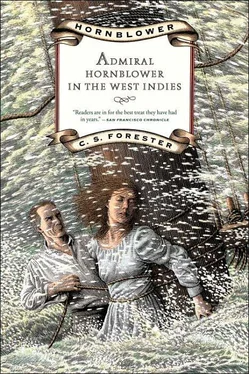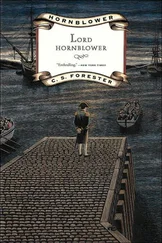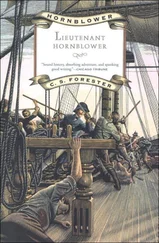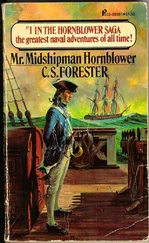“You’ll have to wait for that, my lads,” he said.
He made his way aft to the other group around the wheel and binnacle. There was a corpse here still hanging in its lashing—Knyvett. Hornblower took note of the fact, with the terse requiem that perhaps with death overpowering him then might be some excuse for his not attempting to cut away the foremast. Another corpse lay on the deck, among the feet of the six survivors here. Nine men had survived of the crew of sixteen, and apparently four had disappeared entirely, washed overboard during the night, or perhaps during the night before. Hornblower recognised the second mate and the steward; the group, even the second mate, were croaking for water just like the others, and to them Hornblower made the same grim reply.
“Get those dead men overboard,” he added.
He took stock of the situation. Looking over the side he could see that Pretty Jane had about three feet of freeboard remaining, as close as he could judge while she was pitching extravagantly in the still-turbulent sea. He was conscious now, as he walked about right aft, of dull thumpings under his feet corresponding to the heave and the roll. That meant floating objects battering on the underside of the deck as they were flung up against it by the water inside surging about. The wind was steady from the north-east—the trade wind had reasserted itself after the temporary interruption of the hurricane; the sky was still gloomy and overcast, but Hornblower could feel in his bones that the barometer must be rising rapidly. Somewhere down to leeward, fifty miles away, a hundred miles, two hundred perhaps, was the chain of the Antilles—he could not guess how far, or in what direction, Pretty Jane had drifted during the storm. There was still a chance for them, or there would be if he could solve the water problem.
He turned to the tottering crew.
“Get the hatches up,” he ordered. “You, Mr. Mate, where are the water casks stowed?”
“Amidships,” said the mate, running a dry tongue over his dry lips at the thought of water. “Aft of the main hatchway.”
“Let’s see,” said Hornblower.
Water casks constructed to keep fresh water in would also perhaps keep sea water out. But no cask was ever quite tight; every cask leaked to some extent, and only a small amount of water percolating in would make the contents unfit to drink. And casks that had been churned about for two nights and a day by the surging sea water below decks would probably he stove in, every one of them.
“It’s only a faint hope,” said Hornblower, anxious to minimise the almost certain disappointment ahead of them; he looked round again to see what chance there was of a rain-squall coming.
When they looked down the open hatchway they could appreciate the difficulties. The hatchway was jammed with a couple of bales of coir; as they watched them they could see them move uneasily with the motion of the ship. The water that had invaded the ship had floated up the cargo— Pretty Jane was actually supported by the upward pressure of the cargo on the underside of the deck. It was a miracle that she had not broken her back. And there was not a chance of going down there. It would be certain death to venture amid those surging bales. There was a general groan of disappointment from the group round the hatchway.
But another possibility was present in Hornblower’s mind, and he turned upon the steward.
“There were green coconuts for the use of the cabin,” he said. “Were there any left?”
“Yes, sir. Four or five dozen.” The man could hardly speak, with thirst, or weakness, or excitement.
“In the lazarette?”
“Yes, sir.”
“In a sack?”
“Yes, sir.”
“Come along,” said Hornblower.
Coconuts floated as lightly as coir, and were more watertight than any cask.
They pried up the after-hatch cover, and looked down at the heaving water below. There was no cargo there; the bulkhead had stood the strain. The distance down to the surface corresponded to the three-foot freeboard remaining to Pretty Jane. There were things to be seen there—almost at once a wooden piggin came floating into sight, and the surface was nearly covered with fragments. Then something else floated into view—a coconut. Apparently the sack had not been fastened—Hornblower had hoped he might find a whole sackful floating there. He leaned far down and scooped it up. As he rose to his feet again with the thing in his hand there was a simultaneous wordless croak from the whole group; a dozen hands stretched out for it, and Hornblower realised that he must maintain order.
“Stand back!” he said, and when the men still advanced on him he pulled out his sheath knife.
“Stand back! I’ll kill the first man to lay a hand on me!” he said. He knew himself to be snarling like a wild beast, his teeth bared with the intensity of his feeling, and he knew that he would stand no chance in fight, one against nine.
“Come now, lads,” he said. “We’ll have to make these last. We’ll ration ‘em out. Fair divs all round. See how many more you can find.”
The force of his personality asserted itself; so did what remained of the common sense of the crew, and they drew back. Soon three men were kneeling round the hatchway, with the others leaning precariously over them to look over their shoulders.
“There’s one!” croaked a voice.
An arm went down and a coconut was scooped up.
“Give it here,” said Hornblower, and he was obeyed without question; another was already visible, and another after that. They began to pile up at Hornblower’s feet, a dozen, fifteen, twenty, twenty-three of the precious things, before they ceased to appear further.
“With luck we’ll find some more later,” said Hornblower. He looked round the group, and over at Barbara huddled at the foot of the mainmast. “Eleven of us. Half a one each for today. Another half each tomorrow. And I’ll go without for today.”
No one questioned his decision—partly, perhaps, because they were all too anxious to wet their lips. The first coconut was chopped open at the end, with desperate care lest a drop be spilt, and the first man took a drink. There was no chance at all of his drinking more than his half, with everyone grouped round him, and the man destined for the other half snatching it from his lips at every sip to see how far down the surface had sunk. The men forced to wait were wild with eagerness, but they had to wait all the same. Hornblower could not trust them to make a division without fighting or waste unless he was supervising. After the last man had drunk he took the remaining half over to Barbara.
“Drink this, dear,” he said, as at the touch of his hand she blinked awake from her heavy doze.”
She drank eagerly before she took the nut from her lips.
“You’ve had some, dear?” she asked.
“Yes, dear, I’ve had mine,” said Hornblower steadily.
When he returned to the group they were scraping the thin jelly out from inside the nuts.
“Don’t damage these shells, lads,” he said. “We’ll need ‘em when we get a rain-squall. And we’ll put those nuts under Her Ladyship’s guard. We can trust her.”
They obeyed him again.
“We got two more up while you was away, sir,” volunteered one of the men.
Hornblower peered down the hatchway at the litter-covered water. Another idea came up into his mind, and he turned to the steward again.
“Her Ladyship sent a chest of food on board,” he said. “Food in tin boxes. It was put aft here somewhere. Do you know where?”
“It was right aft, sir. Under the tiller ropes.”
“M’m,” said Hornblower.
As he thought about it a sudden motion of the ship tossed the water below up in a fountain through the hatchway. But it ought to be possible to reach that chest, break it open, and bring up its contents. A strong man, able to stay submerged for long periods, could do it, if he did not mind being flung about by the send of the water below.
Читать дальше











